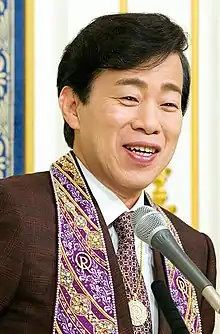Happiness Realization Party 幸福実現党 | |
|---|---|
| Leader | Hiroko Matsune (a.k.a. Ryōko Shaku) |
| President | Vacant |
| Chairman | Hironori Matsushima |
| Secretary | Hironori Matsushima |
| Spokesperson | Hiroko Nanami |
| Secretary general | Tadahiko Saito |
| Founder | Ryuho Okawa |
| Founded | 23 May 2009 |
| Headquarters | 6th floor of Utopia Activity Promotion Hall, Akasaka 2-10-8, Minato Ward, Tokyo, Japan |
| Ideology | Radical conservatism[1] |
| Political position | Right-wing[2] to far-right[3] |
| Religion | Happy Science |
| Colours |
|
| Councillors | 0 / 242 |
| Representatives | 0 / 465 |
| Website | |
| en | |

The Happiness Realization Party (幸福実現党, Kōfuku Jitsugen-tō), abbreviated as Kōfuku (幸福),[4] is a Japanese political party founded by Ryuho Okawa on 23 May 2009. The HRP is the political wing of the conservative Happy Science religious movement.
Okawa was the president of the party until his death on 2 March 2023.[5]
Electoral history
In 2009, the party had 345 candidates, placing it on the ballots of 99% of Japan's 300 constituencies.[4] Many perennial candidates such as Yoshiro Nakamatsu joined the HRP.[6] Despite fielding a total of more than 1 million votes,[7] the party did not win any seats in the election.[8][9]
In 2012, the party again failed to gain any seats.[10]
As of April 2018, the party had 21 elected local councilors.[11]
Policies
According to its manifesto, the group's goal is to more than double Japan's population to 300 million through making child-rearing easier for mothers and accepting foreigners as workforce. It also aims to change the pacifist Article 9 of the Japanese Constitution in order to increase Japan's economic and military power.[1]
The group identifies itself as "conservative"[12] and is generally considered a right-wing,[2] or a radical right party.[3] The party advocates a nuclear deterrent for Japan,[13] denies that the Nanjing Massacre occurred[14] and has called for China to be expelled from the United Nations Security Council.[15] The party has formed links to the American right, having attended the Conservative Political Action Conference in 2012, and bringing with them members of the Tokyo Tea Party, supporting low tax.[7]
In 2022, the party has expressed sympathy for Russia's position following the Invasion of Ukraine, criticizing the Ukrainian President Volodymyr Zelenskyy.[16]
Administration

Jay Aeba, also known as Jikido Aeba (饗庭直道, あえば直道, Aeba Jikido), was, of May 2012, advisor of the Republican National Committee of the United States in charge of Asia, with Yuki Oikawa as one of the officials of HRP.[7]
President
| No. | Image | Name | Took office | Left office |
|---|---|---|---|---|
| 1 |  | Ryuho Okawa | 22 July 2009 | 12 September 2009 |
| - | - | (Vacant) | 12 September 2009 | 27 December 2012 |
| 2 |  | Ryuho Okawa | 27 December 2012 | 2 March 2023 |
Leaders
| No. | Image | Name | Took office | Left office |
|---|---|---|---|---|
| 1 | .jpg.webp) | Jikidō Aeba | 23 May 2009 | 4 June 2009 |
| 2 |  | Kyōko Ōkawa | 4 June 2009 | 29 July 2009 |
| - | - | (Vacant) | 29 July 2009 | 2 September 2009 |
| 3 |  | Zuishō Motochikawa | 2 September 2009 | 12 September 2009 |
| 4 |  | Tomoshige Kimura | 12 September 2009 | 15 April 2010 |
| 5 |  | Sōken Kobayashi | 15 April 2010 | 21 April 2010 |
| 6 |  | Etsuo Ishikawa | 21 April 2010 | 20 July 2010 |
| 7 |  | Shugaku Tsuiki | 20 July 2010 | 27 December 2012 |
| 8 |  | Hissho Yanai | 27 December 2012 | 24 July 2013 |
| 9 |  | Ryōko Shaku | 24 July 2013 | Incumbent |
Criticism
| Part of a series on |
| Conservatism in Japan |
|---|
 |
According to The Japan Times, "for many, the Happies smell suspiciously like a cult".[1] The party has released promotional videos that claim North Korea and China are plotting to invade and colonize Japan after first subduing it through nuclear warfare.
The party has been accused of expressing anti-Korean sentiment, although they deny this. However, they deny that Koreans were forced to labor in World War II, and deny that comfort women (many of whom were Korean) were forced to perform their work.[17][18] To this end, Okawa once said that:[18]
Those Koreans who presented sob stories decades later were plucked from weepy funerals and "bribed" to blacken Japan’s name, such lies now being firmly "embedded in Korean culture".
References
- 1 2 3 McNeill, David (4 August 2009), "Party offers a third way: happiness", The Japan Times, archived from the original on 26 February 2022, retrieved 7 November 2018
- 1 2 Molly Ball (2 April 2012). "Can the Tea Party Take Japan? - Molly Ball". The Atlantic. Retrieved 13 May 2013.
- 1 2 Rydgren, Jens (2018). The Oxford Handbook of the Radical Right. Oxford University Press. p. 772. ISBN 978-0190274559. Retrieved 23 July 2020.
- 1 2 "NHKオンライン". Nhk.or.jp. Retrieved 21 February 2012.
- ↑ "幸福実現党|党役員". Hr-party.jp. Archived from the original on 26 February 2012. Retrieved 21 February 2012.
- ↑ Andrew Joyce (30 June 2010). "Japanese Politics — The Unusual Suspects". The Wall Street Journal. Retrieved 21 September 2015.
- 1 2 3 "Can the Tea Party Take Japan?". The Atlantic. 2 May 2012.
- ↑ "533". Pj News. Archived from the original on 26 February 2012. Retrieved 21 February 2012.
- ↑ "Pursuit Of Happiness - Happiness Tips". Retrieved 13 May 2013.
- ↑ "The Happiness Realization Party". En.hr-party.jp. Retrieved 13 May 2013.
- ↑ "HRP Election Information". Happiness Realization Party. Retrieved 16 May 2018.
- ↑ "The Happiness Realization Party". En.hr-party.jp. Retrieved 13 May 2013.
- ↑ "The Happiness Realization Party". En.hr-party.jp. 16 September 2012. Archived from the original on 13 April 2018. Retrieved 13 May 2013.
- ↑ "The Happiness Realization Party". En.hr-party.jp. Retrieved 13 May 2013.
- ↑ "The Happiness Realization Party". En.hr-party.jp. Retrieved 13 May 2013.
- ↑ "Happiness Realization Party". Happiness Realization Party. Retrieved 6 February 2023.
- ↑ "Master Ryuho Okawa, Founder and President of the Happiness Realization Party (HRP), Delivered the Lecture, The World of Freedom, Democracy and Faith, Celebrating the 10th Anniversary of the Founding of HRP". Happiness Realization Party. 14 May 2019. Retrieved 21 September 2023.
- 1 2 Tucker, Steven (12 March 2023). "Land of the Rising Dead, Part One: Warrior Spirits - Providence". providencemag.com. Retrieved 21 September 2023.
External links
- Official website (in English)
- Official website (in Japanese)
- Various Manifesto of the Party (in English)
°